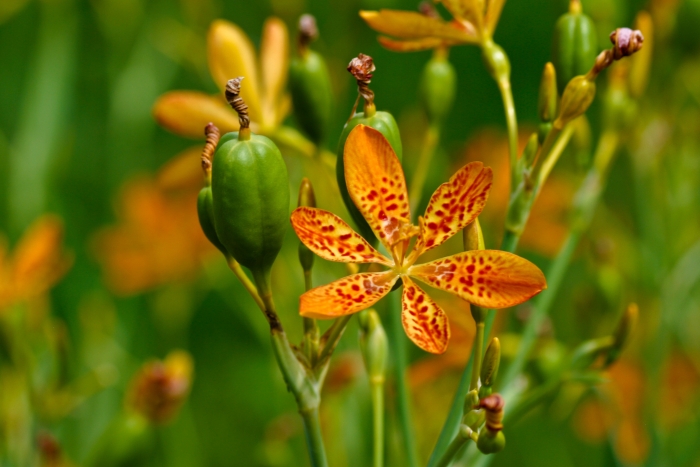Blackberry Lily
(Iris domestica)
Blackberry Lily (Iris domestica)
/
/

Tom Murphy VII
CC BY 2.5
Image By:
Tom Murphy VII
Recorded By:
Copyright:
CC BY 2.5
Copyright Notice:
Photo by: Tom Murphy VII | License Type: CC BY 2.5 | License URL: https://creativecommons.org/licenses/by/2.5 | Uploader: Brighterorange | Publisher: Wikimedia Commons | Title: Belamcanda_chinensis_2007.jpg | Notes: Transferred from Flickr via [[Commons:Flickr2Commons|Flickr2Commons]] |
























































Estimated Native Range
Summary
Iris domestica, commonly known as Blackberry Lily, is a perennial herb native to grasslands, open woodlands, and meadows in East Asia, particularly China and Japan. It typically grows to a height of 0.6–1 meter (2 ft 0 in – 3 ft 3 in) and features rhizomes that spread horizontally just below the soil surface. This plant has 3-5 stems and 8-14 sword-shaped leaves per stem arranged in a fan-like pattern. The flowers, which bloom in summer, are showy and orange with red spots, adding a splash of color to the garden. After flowering, the seed pods open in the fall to reveal clusters of black, shiny seeds that resemble blackberries, hence the common name. Blackberry Lily is hardy to USDA plant hardiness zone 5 and can be propagated by seeds or division.
In cultivation, Blackberry Lily is valued for its striking flowers and unique seed pods. It is a popular choice for ornamental planting in private and public gardens, zoos, and floral displays. The plant is also appreciated for its ability to attract pollinators such as insects and birds. It thrives in full sun and requires medium amounts of water, preferring soils with slow or medium drainage. While generally low-maintenance, it may be susceptible to iris borers and root rot if grown in overly wet conditions. To prevent these issues, ensure good soil drainage and practice crop rotation if planting in large numbers.CC BY-SA 4.0
In cultivation, Blackberry Lily is valued for its striking flowers and unique seed pods. It is a popular choice for ornamental planting in private and public gardens, zoos, and floral displays. The plant is also appreciated for its ability to attract pollinators such as insects and birds. It thrives in full sun and requires medium amounts of water, preferring soils with slow or medium drainage. While generally low-maintenance, it may be susceptible to iris borers and root rot if grown in overly wet conditions. To prevent these issues, ensure good soil drainage and practice crop rotation if planting in large numbers.CC BY-SA 4.0
Plant Description
- Plant Type: Herb
- Height: 2-3 feet
- Width: 0.8-2 feet
- Growth Rate: Rapid
- Flower Color: Yellow, Orange, Red
- Flowering Season: Summer
- Leaf Retention: Deciduous
Growth Requirements
- Sun: Full Sun, Part Shade
- Water: Medium
- Drainage: Slow, Medium
Common Uses
Bee Garden, Bird Garden, Border Plant, Butterfly Garden, Deer Resistant, Drought Tolerant, Groundcover, Hummingbird Garden, Low Maintenance, Rabbit Resistant, Rock Garden, Salt Tolerant, Showy Flowers, Street Planting
Natural Habitat
Native to grasslands, open woodlands, and meadows in East Asia, particularly China and Japan
Other Names
Common Names: Leopard Lily, Leopard Flower, 범부채
Scientific Names: , Belamcanda chinensis, Iris domestica, Belamcanda flabellata, Moraea chinensis, Pardanthus chinensis, Ixia chinensis, Belamcanda punctata, Gemmingia chinensis, Belamcanda chinensis f. flava
GBIF Accepted Name: Iris domestica (L.) Goldblatt & Mabb.